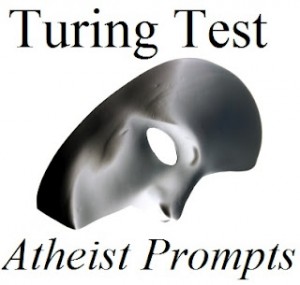This is the eleventh entry in the Atheism round of the 2012 Ideological Turing Test for Religion. In this round, the honest answers of atheists are mixed in with Christians’ best efforts to talk like atheists. It’s your job to see if you can spot the difference. The voting link appears at the end of the entry, and you can look at all entries in this round here.
When (if ever) have you deferred to your philosophical or theological system over your intuitions?
I am not of settled mind on a lot of things. Over the years I’ve done a lot of philosophical reading and one of the prime conclusions that I’ve come to (from Kant, Heidegger and others) is that the man who has fully formed a static system of thought and put in the last stone is no longer really living. So I keep my thoughts free, am open to hearing them challenged, and try to consider new ideas with the degree of seriousness they seem to merit. Do I bow absolutely to my “system” when it contradicts an apparent truth? No. My system is not so rigid. Do I recognize that sometimes prejudice blinds us, and that deeply ingrained habits of thought conceal important truths behind a screen of “barbarism” or “obscurantism”? Yes. So I stick to my best judgment, even when it contradicts long-held intuitions, and I try to weigh all things equally with the hope that the truth, ultimately, will win out by virtue of its clarity, simplicity, and completeness.
Are there people whose opinions on morality you trust more than your own? How do you recognize them? How is trusting them different than trusting someone’s opinion on physics?
To be quite honest, I try to steer clear of moral nitpicking. Years ago I went through a Camus phase, and had a lot of quasi-profound thoughts about nihilism, abysses and “forging one’s own meaning”. I don’t really buy into that stuff anymore, though it has a pleasant poetic ring to it. Now I’m more of a pragmatist on the whole. What I want is basically to be happy, and for the people I love to be happy, and on better days out of solidarity with the sad set of humanity, I’d like them all to do well too. But common sense tells me that people are different and will do best at work and play, at home or on the job, in very different ways. Do I recognize a real moral authority in the world that has the right to order others around? No, not really. Do I admit that some people thrive best under the supposedly-transcendental guidance of a moral leader? Yes, I do. But do I worry about power politics and manipulation? A bit. Lately, more than a bit.
Can you name any works of art (interpreted pretty broadly: books, music, plays, poetry, mathematical proofs, etc) which really capture the way you see life/fill you with a sense of awe and wonder? You can give a short explanation or just list a few pieces.
I like sprawling landscape paintings, the movie Waking Life, Kurosawa’s Rashomon. Groundhog Day is classic, as is Salman Rushdie’s Midnight’s Children. Nietzsche writes beautifully, even if he was mostly insane, and I’ve benefitted a lot from Foucault’s historical deconstructions, especially the last few chapters of his History of Madness.
Click here to judge this entry, and, once you’ve voted, feel free to speculate and trade theories in the comments or look at other entries in this round.












